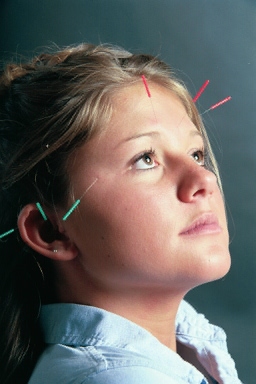| |||||||||||||||||||
General Acupuncture F.A.Q.
Please feel free to contact us with any other questions | |||||||||||||||||||
| 1. Are the needles clean? All acupuncture needles and instruments must be sterile. We only use disposable, single-use needles. All pre-sterilized acupuncture needles are manufactured, packaged, and shipped in sterilized containers to ensure compliance with the law. Acupuncturists are required to enroll and pass a National Clean Needle Training Course in order to insure proper handling and use of all needles used in treatment.
Patients comment on the comfort of a treatment and how relaxing it is. Unlike hypodermic needles you see at the doctor's office, which are large and hollow, acupuncture needles are solid and extremely thin.
3. What happens when an acupuncture needle is inserted? The needle contacts and regulates an inner force called "Qi" (Vital energy). When there is disease, there is a disharmony with the Qi or life force within the body. This can be due to many things such as a deficiency of Qi (not enough to go around), a stagnation of Qi (not moving very well), or an excess of Qi (too much which may go where it is not supposed to go). Acupuncture helps to bring harmony back to the body by balancing the Qi and restoring your health. As a first step, the acupuncturist examines a system of naturally flowing Qi. These energies should function like invisible maintenance crews, whose many tasks keep the body running smoothly since the Qi is behind every physiological and psychological function, from the circulation of the blood to the prevention of emotional hysteria. If the Qi is no longer flowing well, an ailment will be eminent. The acupuncturist then, as a second step, guides the action of the needle to return the inner workings to as normal a state as possible. Guided needles actually perform more that one hundred and fifty different kinds of healing activities, releasing blockages, restoring strength, boosting the immune system, etc.
4. How long do the needles stay in? Since Chinese medicine looks at every person individually, each treatment can vary from person to person, but most needles stay in for an average of 25 minutes.
5. Are needles the only form of treatment? No. Other modalities and techniques that may be used include: Acupressure, Electrical Stimulation, Exercise, Cupping Technique, Moxibustion, Nutrition, and Chinese Herbs.
Acupuncture is a complex system of diagnostic corollaries that take into account the entire person, not just the isolated symptoms. It is a practice based on discerning a pattern of imbalance in the body and treating accordingly. This imbalance can be based on physical and/or emotional difficulties. An acupuncture diagnosis includes patient observation, questioning, and palpation. Your acupuncturist will ask you a detailed list of questions to determine the true nature of your complaint, including inquiries into your diet, digestion, emotions, pains, sleeping patterns, urination, and bowel movements. Your acupuncturist will palpate your pulses on your wrists in order to diagnose your internal imbalances. Your acupuncturist will also look at your tongue in terms of its color, shape, coating, and overall texture, which can reveal much about your health. This information will then be organized into patterns, and a diagnosis and treatment plan will be constructed individually.
7. How many treatments will I need? Each patient is unique. The number and frequency of treatments will vary from patient to patient. Some patients begin to respond favorably after only one or two treatment. Others may not improve until the eighth or ninth visit. In general, acute conditions require less treatment than chronic conditions. While a specific problem is being treated, you may visit your acupuncturist once or twice a week and gradually reduce the frequency of treatments to once or twice a month. To simply maintain good health, you may limit your treatments to once every season -- four times a year.
8. How long are office visits? Initial visits are approximately ninety (90) minutes. Follow up visits are approximately thirty-five (35) minutes.
9. Will my insurance cover my acupuncture treatment? Health plans vary between insurance companies. Many plans cover all or some portion of acupuncture. On your first visit, we will be happy to take your insurance information and determine your level of benefits. If your insurance does not cover acupuncture, we offer different payment structures for you to choose from.
10. What does acupuncture feel like? The needles used for acupuncture are sterile, disposable, solid, and micro-thin. Most people feel a slight sensation upon insertion, and then you don't even know the needle is there. After the acupuncturist has inserted the needles, a profound feeling of relaxation and well-being is experienced. Some patients can actually take a nap, while most just enjoy the "relaxing time".
If you still have any questions please feel free to contact us.
| |||||||||||||||||||
|
Home ·
About Us ·
About Fertility ·
F.A.Q. ·
Conditions ·
Success Stories | |||||||||||||||||||


